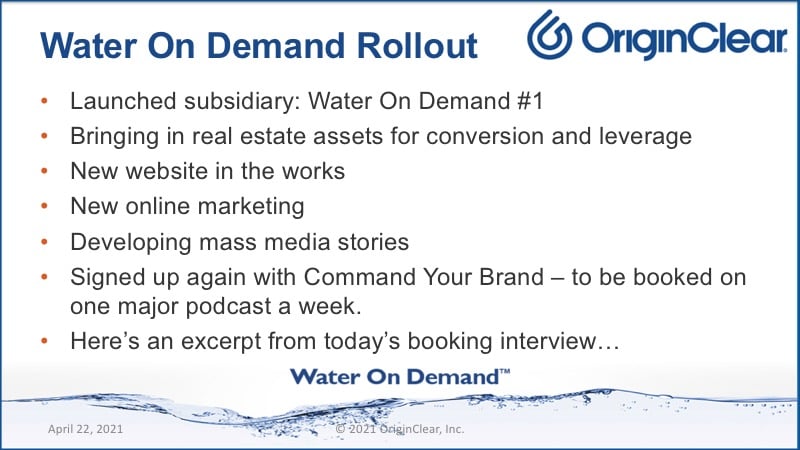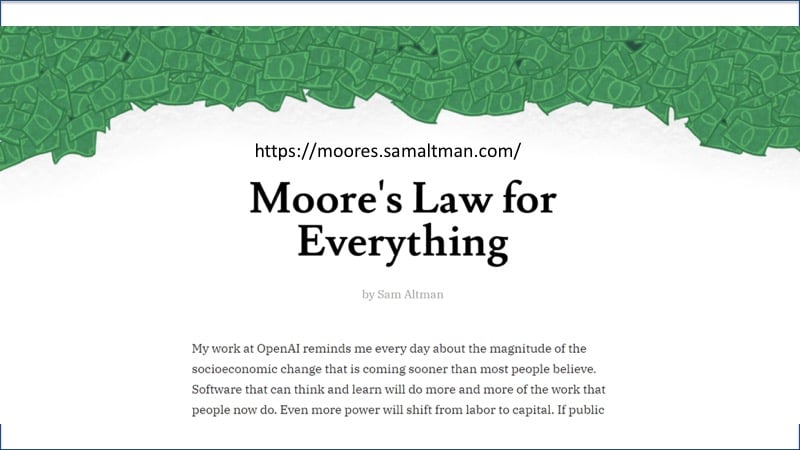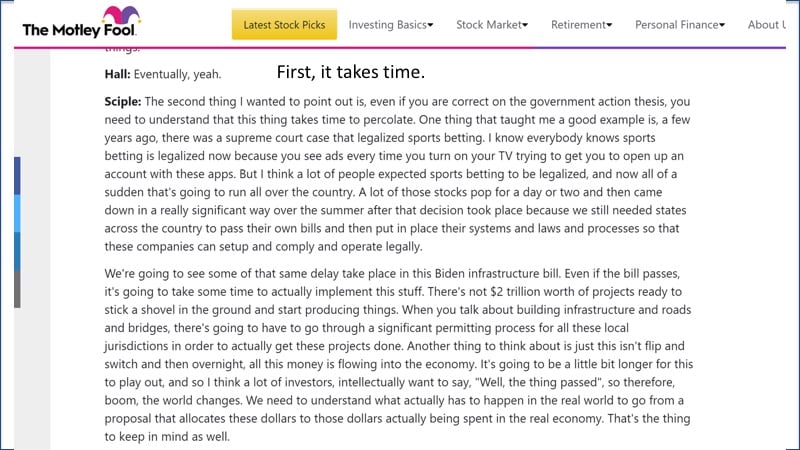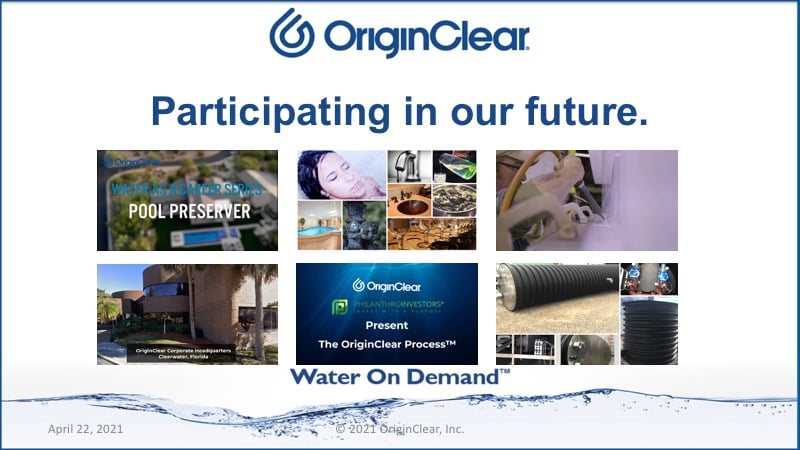Insider Briefing of 22 April 2021
If $111 Billion won't solve the problem in water, what will? Is it possible to decentralize by empowering local businesses? Is water actually mid a high-tech revolution? Find out, and how Water on Demand connects all the dots...
FEATURED OR COVERED IN THIS BRIEFING — QUICK LINKS
- What's up with the OriginClear 10K annual report?
- A new development on the subject of company acquisitions.
- The Water on Demand rollout plan.
- A ramp up of podcasts and a clip from the CEOs booking interview and our story.
- A concise statement of Subscription Water and Water on Demand.
- Our plan for incorporating AI into our Water on Demand program and company operations.
- The HOT new topics that have emerged.
- Moore's Law for Everything and how AI will cause a shift from labor to capital.
- How the high-tech revolution taking place will generate phenomenal wealth.
- How AI and the high-tech revolution relate to Water on Demand.
- Excerpts from Pavel Molchanov's analysis at Raymond James on safe water violations and the Biden infrastructure bill relating to water.
- The Motley Fool's take on the Biden plan.
- The bigger problem in water and our solution to it.
- Why OriginClear's VP Business Development, Ken Berenger, predicts an accelerated adoption of our model and Water on Demand.
- Our four investing options, their main features and what they will fund.
- How you can participate in our offerings and programs.
- Why Ken B says we are positioned for strength and just what that could mean.
Transcript from recording
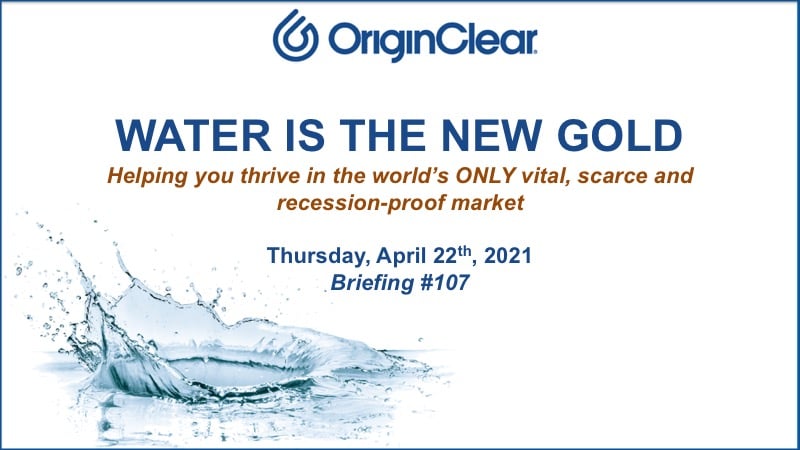
Introduction
Riggs Eckelberry:
And hello everyone, lots to talk about. And Water is the New Gold and "Helping you thrive in the world's ONLY vital scarce and..." You're going to see when we cover this whole Biden infrastructure plan, just how vital water is and the keys to making things happen in this space very, very interesting.
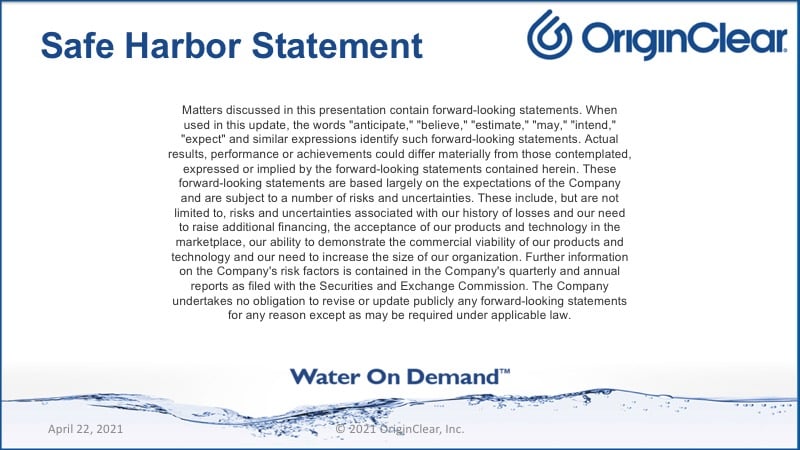
Forward Looking Statements
Quickly safe harbor statement, of course, that we're not perfect, but we try very, very best and there are risks and uncertainties.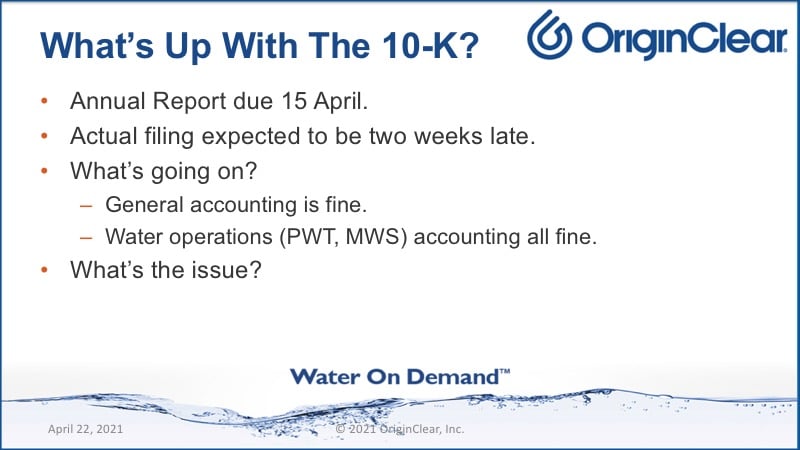
Annual Report
Okay. Now I quickly wanted to deal with an issue which has to do with the 10K, that's our annual report. It is due with its normal extension on 15 April. And looks like we'll be two weeks late. So because I like to tell people exactly what's going on, I'm going to cover that.
All of our general accounting operations are working fine. Our Texas and Virginia operations are doing a fine job of accounting of their projects. They're very busy, but they were ready almost two months ago. So what's going on? How come we have a delay? And what's the story? So let me cover that.
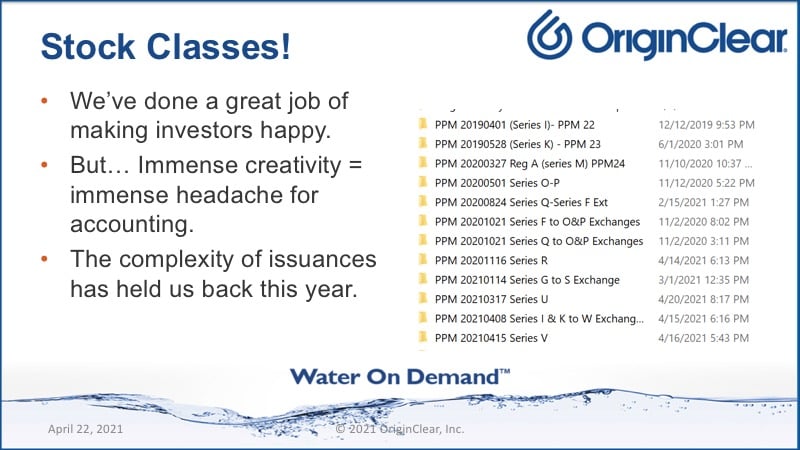
Stock Classes
We have done so many, this right here on this screen, you see 12 different series of preferred shares, various exchanges of from one series to another. It has been from an accounting point of view, an immense headache. It has done wonders for our investors.
Our investors are very, very happy, but every bright idea that we have creates unbelievable consequences for the poor accounting people. And that's what's held us back quite frankly. Okay. So what are we doing about this? Because this is not how a company turns into a world-class company. Very simple.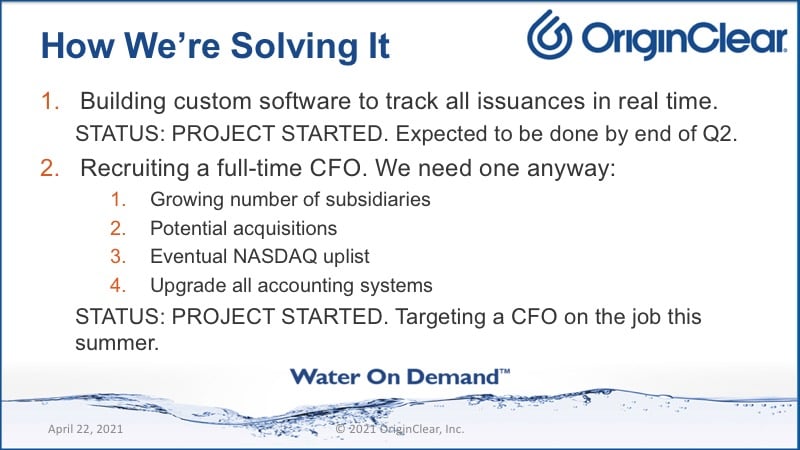
Tracking System
First of all, we are building... Software is always cheaper than using people to track things. All issuances will be tracked in real time. Our investors are going to like that because they're going to see that we'll have a much better tracking system for stock issuances, and also it's going to allow us to pull, for example, our exact capital position in real time.
So what's the status of that? It has been started and it will be done by the end of the current quarter by estimation. Okay.
CFO
So that's not all. We need a CFO and we need one anyway, we're setting up the subsidiaries with large funding packages. We're looking at potential acquisitions. I'll cover that in a minute. We are looking at a NASDAQ up list, which means you've got to have, again, a world-class CFO.
Accounting Systems Upgrade
And finally, we need to upgrade our accounting systems, which are on QuickBooks and probably should be on something a bit more solid to deal with where we're going. Okay, status. We started that project. I have someone working on this right now, and we are targeting to have a CFO on the job this summer to compliment the existing hard-working people.
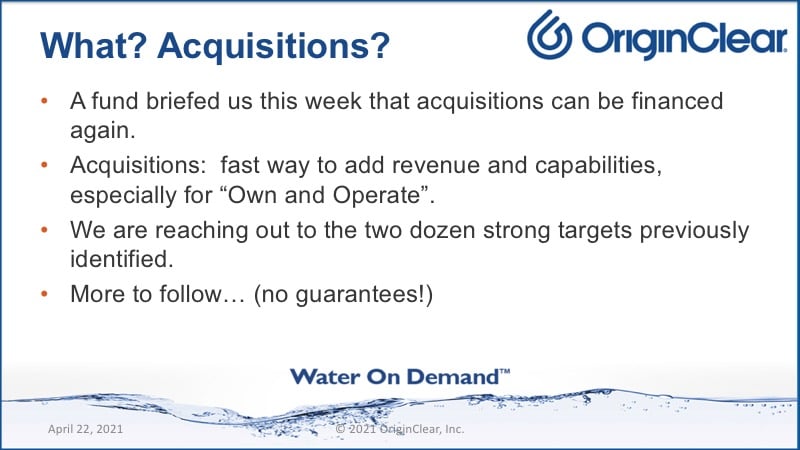
Acquisitions?
Now, what's this about acquisitions? Well, a fund that we know well met with us this week and they said, "Look, the acquisitions window is open. Literally it's very recent, but it looks like Wall Street can get these things done fast. And that's of course a great way to buy revenue and buy capabilities.
Own and Operate
And here's the thing that I want to work on, it is the own and operate side. In other words, we're very good at designing and building, but if we're going to own and operate systems out there, then we have to have all this capability of doing metered delivery and so forth.
And one way to do that is simply to require companies that know how to do that. We already have a database. Well actually, well over a hundred companies, but the two dozen that we like, we're going to be following up on and telling them, "Hey, let's let's work together." So there'll be more on that.
Marketing Campaign
All right, what's going on with Water on Demand? Well, we launched a subsidiary called Water on Demand Number One, which is bringing in real estate assets for conversion and leverage into cash. I'm working personally on the new website and also on the new online marketing. Because here's the thing, we're paying for online marketing to bring in potential investors, et cetera. But it's also a way to get our message out.
Last year, we know we spent something like $10,000 and we got a million views on an ad for Pool Preserver. Now, of course it gave everybody an idea that we were doing pools, which was only a part of the story, but it proved to us that a good paid marketing campaign can actually create a tremendous amount of visibility. We're also developing stories for the mass media. And I'll talk about that some more.
Series of Podcasts
And I resigned up again with Command Your Brand. This is a world-class podcast booking agency. You remember last year, how there were all these podcasts I was on? Well, they've promised to get me onto a major podcast every week. That's 24 podcasts in six months.
So I thought I would play an excerpt from today's booking interview where I talk about what's hot and what's not, what's exciting. And it'll give you a sense of what we'll be saying.
Start of video presentation
Transcript from recording
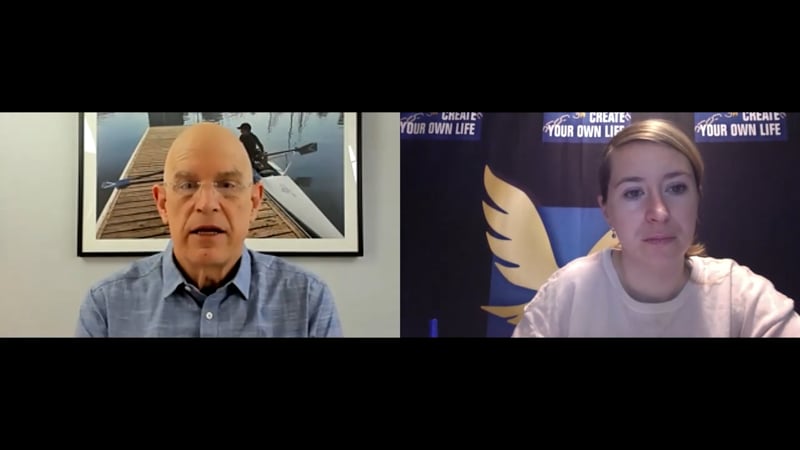
Over 100 Billion Every Year
Riggs: But the situation with water is that the big infrastructure bill being passed or being proposed by the Biden administration is the largest ever allocation for water. It's $111 billion. And that's wonderful until you realize that our backlog is $105 billion every single year. Every single year, we fall behind with our water infrastructure, our pipes, our ability to...
We have a growing population and so forth, and our ability to treat the water and take care of all the industrial toxins falls behind by over a hundred billion dollars. So this is a drop in the bucket.
Treat Your Own Water
What can we do about it? What's the solution? And what we learned over time is that local business can take up the slack. If you're already making water dirty, clean it where you are. Send treated water to the city, which means the city has much less of a burden and they can take care of consumers. That's fine.
Breweries, farms, housing subdivisions, wide variety of factories, you name it, that are all making dirty water, can treat their own water. They will end up saving water because they won't be charged the cleanup rates.
Opportunity
In many cases, they're being turned down right now. The cities are saying, "No, we can't take it," because cities are completely overloaded. We have an opportunity here to decentralize water treatment, to take it to the edges and make local businesses do their own work.
Subscription Water — Water on Demand
What's stopping these deals from happening? They're ready to go, et cetera. Money. The solution is "subscription water," just like you're accustomed to your water meter in your home, et cetera. Well, these businesses, if you're a brewery, you're not in the business of treating water, you're in business of making beer.
Interviewer: Mm-hmm.
So keep making beer. Sign here, a machine will show up, clean your water, you'll pay by the gallon, it'll be a good rate. Don't worry about it. And you're done. This is called Water on Demand™. This is a new focus of our company. This is where we're going. Water on Demand is how we're going to dramatically...
We call it a FinTech for Clean Water™, because it's a way to leverage finance as a way to accelerate this local water treatment, that is going to finally solve this problem that Washington's not going to solve.
Pay by the Month
Interviewer: So, just so I can understand it too, isn't that similar to what they do with solar panels as well? You rent your solar panels or...
Riggs: SolarCity. Very good example. Look, pay-as-you-go is the way to go. It's how, when you rent an apartment, do you pay for it? Netflix, cellphones, everything is subscription. The key here is, by going to a subscription model, we have a much longer relationship with our customer. I mean, I still have my EarthLink email address from 1994, right? It just goes on forever, that relationship. You pay by the month, whatever it is.
Solving Water at the Local Level
So we had this long relationship with the customer. We make more money from them outsourcing the problem to us. Just outsource it. Don't worry about it. We'll take care of it. We'll make sure the water's good. You just pay for the water being clean to the standard that the city requires.
You're going to pay more, but you're not going to have to worry about it. The problem just goes away. We're solving water at the local level, and not waiting for the federal government, or states, counties, and cities to solve it, because they're not.
Agriculture and Capital Expense
Interviewer: Big Agriculture, don't they get taxed a lot anyways, because of water issues and pollution?
Riggs: Agriculture is the biggest user. In any given county in America, agriculture is the biggest user of water.
Interviewer: So, is it kind of like pay now to clean it or pay later in taxes, anyways? Right
Riggs: Fines. They get fined for, they mess up the rivers, et cetera. We know of a bunch of farms in the Midwest. There's one farm in Iowa that has its manure trucked away by Waste Management to a landfill and spends $7 million a month on the trucking.
We could spend a fraction of that one time and they would get beautiful zero-waste fertilizer and clean water, organic fertilizer. They're doing this. They're spending 7 million, 7 million, zz, zz, zz... They don't have the million dollars capital, but we say, "No. No. No. Don't pay up front, just start paying our bill."
AI (Artificial Intelligence)
Well, I'm also working on AI because one of the cool things about AI is that if you're sitting there at a network operations center, and you've got a brewery in Santa Rosa, California, and you're trying to tweak the water quality, well, AI can do that better.
There's a whole technology stack that we can get into, which is not basic water cleaning technology. People know how to clean water. That's not the technology the world needs. What the world needs is the high tech part of water treatment.
Like Airbnb
Here's the deal with water, huge industry. It's not going to be changed just by us. We are going to have to delegate, creating a market where water companies, investors can talk directly to each other and you're just in the middle making sure, like Airbnb, that there's no fraud, quality's good and so forth. But you're letting people do stuff. That's the eventual step.
So that's kind of our plan, is to ripple out this new way of handling the water problem in the world. And by not trying to be the people doing everything, we actually can make the change happen.
Transformative Profits
But a lot of my shareholders are like, "Riggs, I'm doing well, stock's doing fine, but thank you for saving water." That's much more important for them. So, we're really looking for people who want to do something about water in the world, and not just by sending money to charity: water in Africa.
But guess what? We have a problem right here in America, right? And if you do it commercially, as opposed to with donations, then it's a machine. You throw donations at something, it just fixes a well. Great. Okay. But, what's the machine? And that's where if you can build a commercial machine, an engine like an Amazon engine, and that's what we're doing. So people get excited about that. Wow. I can do something about water. I can invest with a purpose. I can do something about water and make, maybe, a ton of money, transformative profits. Everybody wins.
Interviewer: Excellent.
End of video presentation
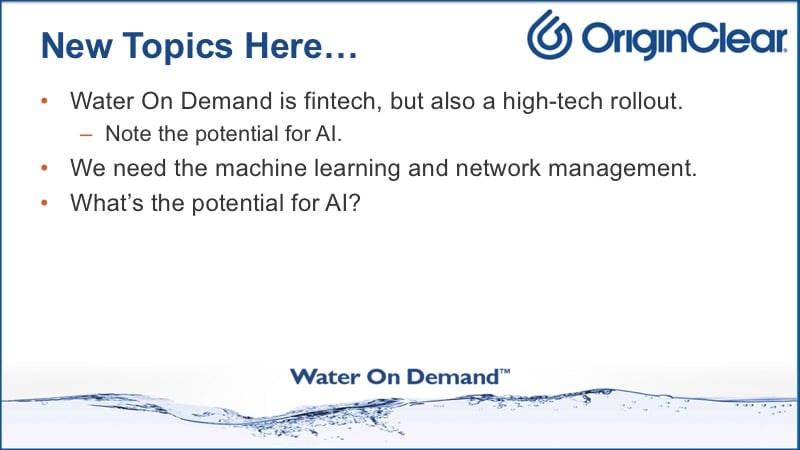
New Topics
Riggs: So, that's just a few excerpts from the intake interview today. And now this opens up a few items that I spoke about today in that interview. So, let me just cover that because this is very interesting. There's a whole new set of topics here that I wanted to get into. All right.
New topics that were covered in this booking interview. Very interesting. Water on Demand is FinTech, but it's also a high tech rollout. Note the potential for AI. We need machine learning and network management. Now, what is the potential for AI?
Shift from Labor to Capital
There is a very interesting article that I read a couple of days ago. Moore's law for everything. Moore's law basically says that everything doubles every couple years. There's actually a new law that's updated from Moore's, which is called Neven's law, which is that everything doubles doubles every couple year, which is ridiculous. That's a Google thing.
But nonetheless, if you go to this address, you can read the full article. But basically, there's going to be a shift from labor to capital. AI, basically, automates a tremendous amount of things that humans normally do.
Imagine, for example, that we're managing 20 or 40 waters a service, or Water on Demand type sites, and we have people sitting at dashboards and fiddling, "Oh, there's an alarm about the blah, blah." Well, we'll automate that, but then we get the machine learning that goes, "Hey, something happens because of a particular input, and then the something else happens, and things get worked out."
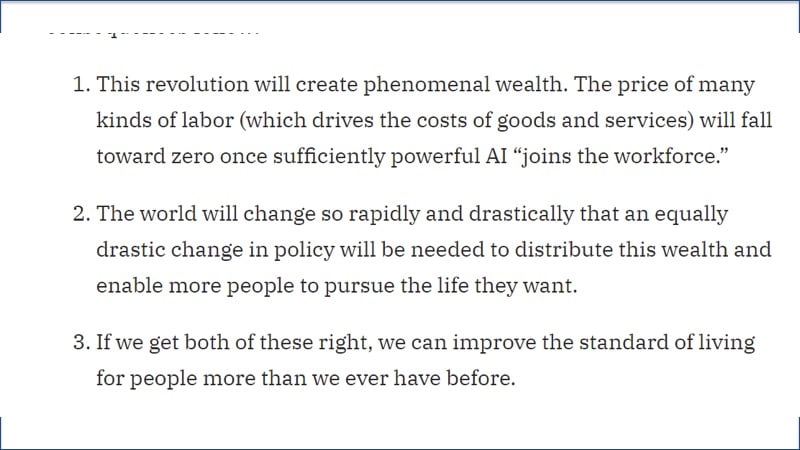
Phenomenal Wealth
So, that's the AI side of things. And it's really, really interesting. This article says that first of all, this revolution will create phenomenal wealth. And I think we're seeing a lot of that with, for example, the crypto boom, because with crypto, it goes in the direction of AI, basically.
But AI joins the workforce, and this will mean that there's a whole different world, really, and we can improve the standard of living. This article gets into that. It's very, very interesting. Kind of off topic for us.
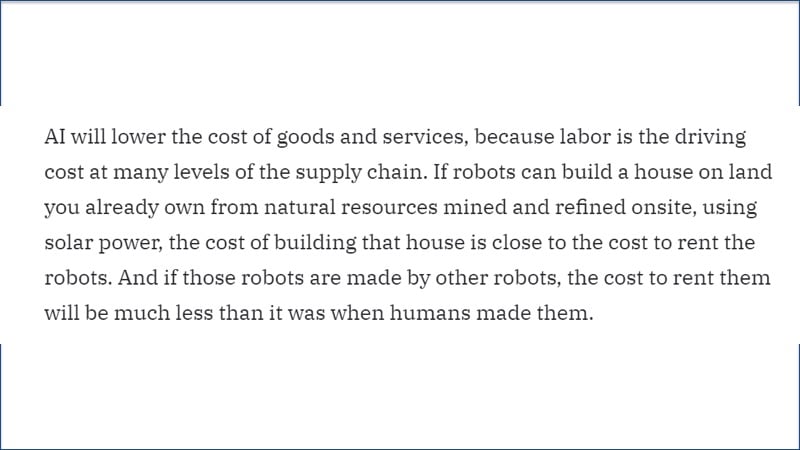
But, AI will lower the cost of goods and services because labor is the driving cost. If robots can build a house on land, blah, blah, blah, then it's kind of like the cost of building the house is close to the cost of renting the robots. So this is really, really interesting.
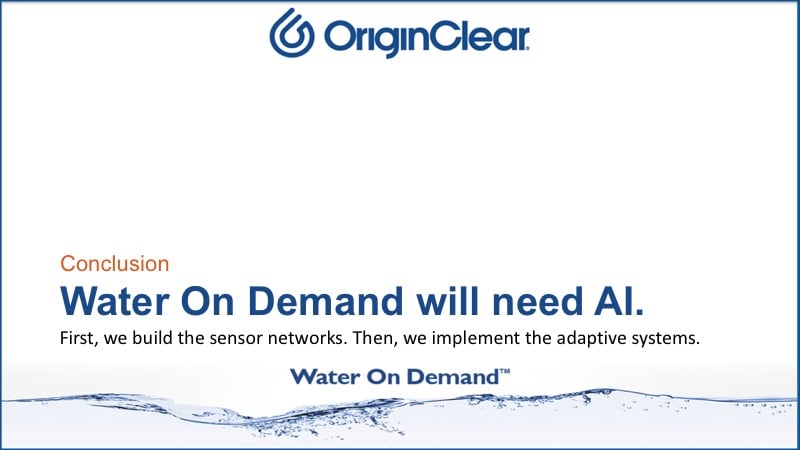
High-Tech Revolution
Now, Water on Demand will need AI. First, we had to build the sensor networks so that we have systems out there that are pay-per-gallons, so they're metered. And they're tracking the quality of the water.
This goes to network operating centers, there's dashboards that are initially implemented by people, but then we get into these adaptive systems that learn, that do the machine learning, and that's where we start to get AI. This is not overnight. This is not something that's going to happen overnight. Look how long it took for Elon Musk to do the self-driving car, and he's not even there, really. But the point is, and I don't want to compare myself to Elon Musk, it's non-trivial, as they say. But I believe that what we are in a revolution of with water is a high-tech revolution, and that's what's interesting.
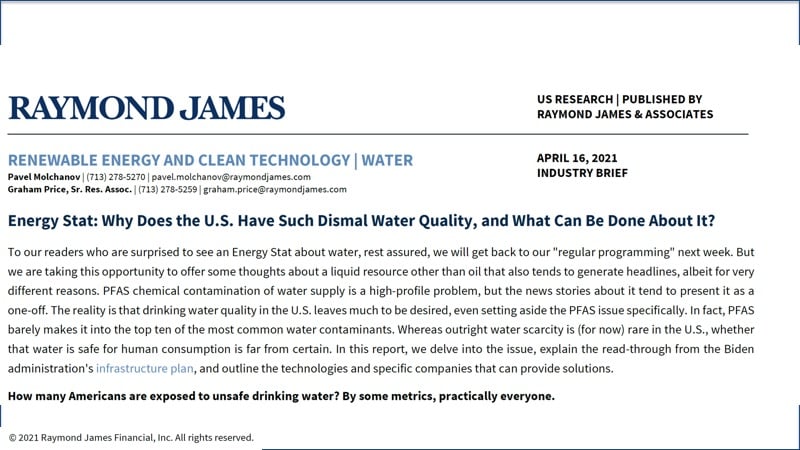
Everyone is Exposed
All right, now, if you read today's CEO update, I promise to get into Pavel Molchanov's update at Raymond James, and he issued an update which I'm going to cover some excerpts on, and this is interesting stuff.
Of course it's an open secret, water in the US is terrible. And this PFAS, it's called the forever chemical because it doesn't leave, and it is actually not even in the top 10 of the most common water contaminants. Now there is water scarcity, but he's saying it's not the worst problem. The worst problem is that it's not necessarily safe, so practically everyone's exposed.
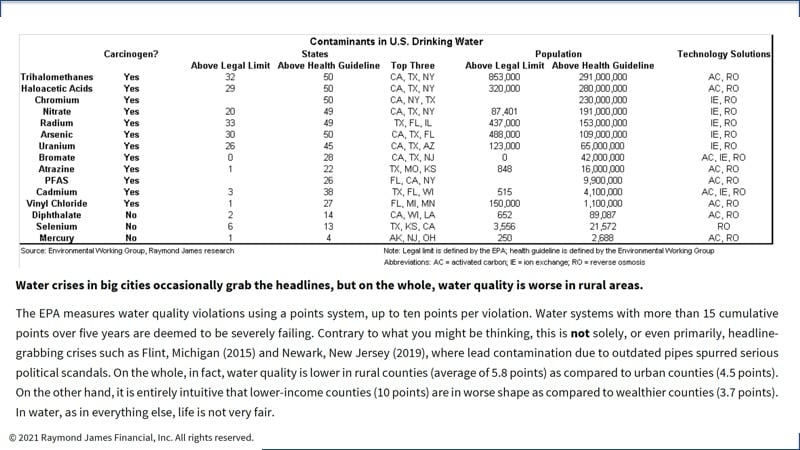
Safe Water Violations
Look at trihalomethanes, almost 300 million people are exposed. Top three, California, Texas, New York, and you get a whole bunch more, chromium, nitrate, radium, all these interesting things. So these are problems, and even if you just choose the legal limit, there are violations.
Here's the interesting thing is, we talk a lot about Flint, Michigan, Newark, New Jersey, South Bend, Indiana, et cetera, but guess what? Rural counties are far worse off, and guess what's happening, everyone is moving into the country because they can work from home. So we have these rural counties, which have poor water systems, and people are moving in there and overloading it. So, not very fun.
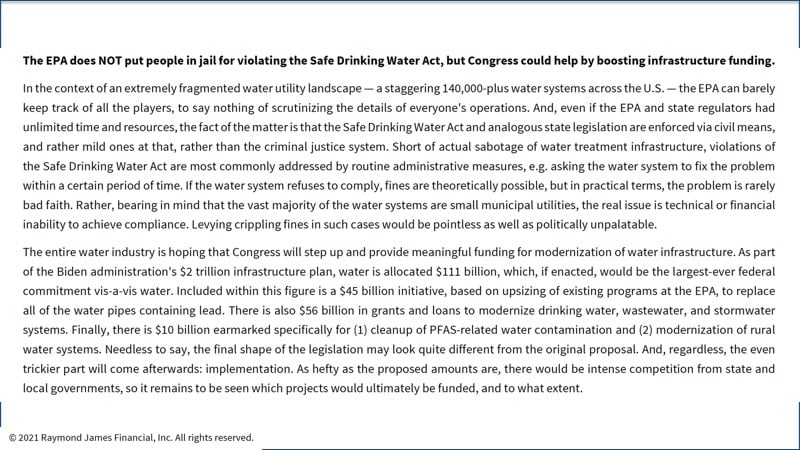
The Real Problem
But anyway, the real problem, of course, is that we have 140,000 plus water systems in the United States. Forget EPA, EPA can't stay on top of it. They try, I certainly don't think that EPA is doing a bad job, but it's a Herculean problem. And realistically you can't really fine these utilities, and so how do you go about it?
Now here's where he gets into the infrastructure plan, $111 billion, largest ever federal commitment concerning water, and that's all great, and there's some good things in there, lead, cleaning up the forever chemicals, modernizing rural systems, et cetera. Now it's far from done, there's a big fight in Washington, I'm not going to get into it, but let's just assume that this thing happens.
It Takes Time
Okay, fine, let's assume we have $111 billion for water, what's the problem? Well, first of all, and here's an article with Motley Fool, it takes time. Even if the bill passes, it's going to take some time to actually implement this stuff. There's not $2 trillion worth of projects, ready to stick a shovel in the ground. He's talking about infrastructure and roads, but it's also true about water.
So something passes, that does not means it happens, right? The Obama administration got all tied up in knots around the Solyndra thing, and this and that, they were trying to rush things through. It was a mess. In fact, in the couple of years after all the money showed up to do this stuff, infrastructure spending went down, because it takes time.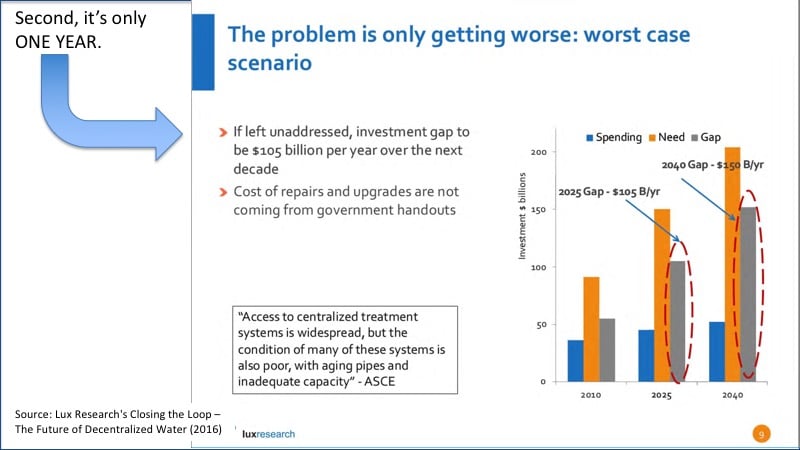
The Bigger Problem
But here's the bigger problem, $111 billion only covers one year. We've had an investment gap that's 105 billion per year over the next decade. This was a webinar that came out in 2016. So that's a gap, and the gap goes from 105 billion a year to 150 billion, you can see on the far right there, by 2040. It gets worse and worse.
Access to centralized treatment systems is widespread, but the condition is poor, et cetera. So there's just no way that the feds can do something about it. Well, what's our solution?
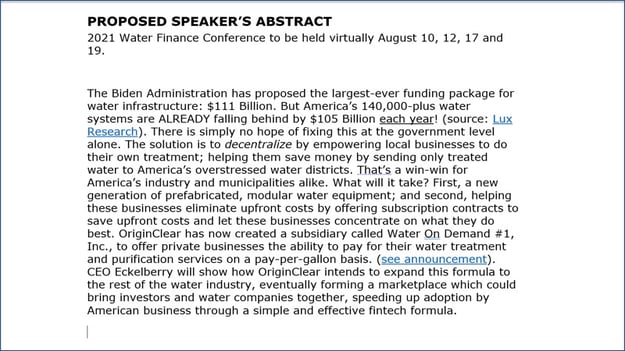
What's Our Solution?
And this is a speakers abstract that I wrote today for a water finance conference that's happening virtually, and basically what I'm saying is, look, there's no hope of fixing it at the government level, what we need to do is decentralize by empowering local businesses, and that way they can send only treated water to these water districts, which then will have less of a load. It's a win-win.
Now, what is it going to take? The technology we have with Modular Water™, Systems in a Box™ that we have, and secondly, the subscription contracts. And so I'll be talking about this, hopefully at this finance conference, but certainly the world's going to hear a lot about this. The ability to pay for water treatment on a pay per gallon basis, and how we eventually want to form a marketplace to bring investors and water companies together, what we've called the Airbnb for water,
Last year we were all excited about that until we realized that we first needed to get our own house in order and implement it. So that's the quick picture and what's been going on, and the look of things from where I stand, I'm extremely excited about the potential for this.
Accelerated Adoption
I'm going to quickly cover the Participating in our future part. Ken, you had some thoughts that I thought were pretty exciting. Did you want to share them?
Ken: I've been experiencing over the... look, spending sometimes eight or ten hours a day speaking to our investors and prospective investors, I don't think that I've ever had more people intuitively understanding what we've talked about. Usually have to spend a few minutes describing what we do, and sometimes it's three quarters of the conversation.
I've had more and more people finishing sentences for me in the past month than I've ever had in my life. As soon as I get to the point where a business is going to simply sign a contract and a service level agreement, and they're going to pay by the gallon, I have people who say, "So they're going to treat it like a utility?" Then I go, "Exactly".
So I believe that we're at a point where, if we can broadcast this message, this solution broadly, I think the adoption of this, because it's so vital, could be many, many times faster of other recent disruptions you've seen in the market in the past 20 years, and that's very exciting to me.
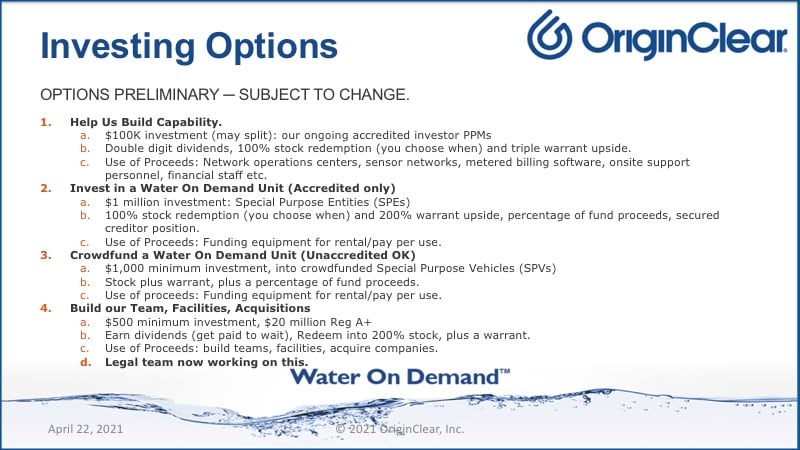
Series of Options
Riggs: Very cool, very cool. Well, to back it up, we have a series of investing options. The one that we're about to start, which is basically a very generous, you get your investment back in stock at the time you choose, and in the interim you get 10% dividends, and then there's triple warrants, which means basically you get the ability to up to triple the benefit that you get, so it's like a 4X kind of thing.
Now what are we going to use it for? Again, these network operating centers, the sensor networks, the meter billing software, the onsite support personnel, financial staff, general operations, et cetera. And that really, Ken, is your bread is your bread and butter, right?
Ken: Yes.
Water on Demand
Riggs: And we're trying to wrap up the previous round, the very popular Series R, but this is what's coming. Okay, next is Water on Demand. Now these are larger investments, million dollar. We built Water on Demand Number One, which is a first one, and opened a $20 million private placement, and this is to fund the equipment for these Water on Demand projects.
And it has a very generous thing, you get stock, you get double warrants, and you get a percentage, 25% of net profits from the fund, and you are a secured creditor. So that's a very good investment for people wanting to do a larger amount.
Crowdfunding
Now, crowdfunding. We are looking at, and I just opened discussions with a portal that I know very well, that is interested in working with us taking stock too, not just getting, charging us fees, but basically to build a series of what I'm calling them funds, not really funds what they are is subsidiaries that have money that then invest the money. So they're not technically funds, but this will fund this equipment for this pay-per-use program that we have.
And finally, we have the reg A, which we had for a year and it had expired on 27 April, and we're going to reload it, but this time we're going to add stock, potentially a warrant. We're still talking about that. And that is going to help us to acquisitions, build teams, facilities, et cetera. And I have our legal team working on this flat out. So that's the array of things and really, Ken, you're the one who knows how to put it in really match it to people's interest and so forth.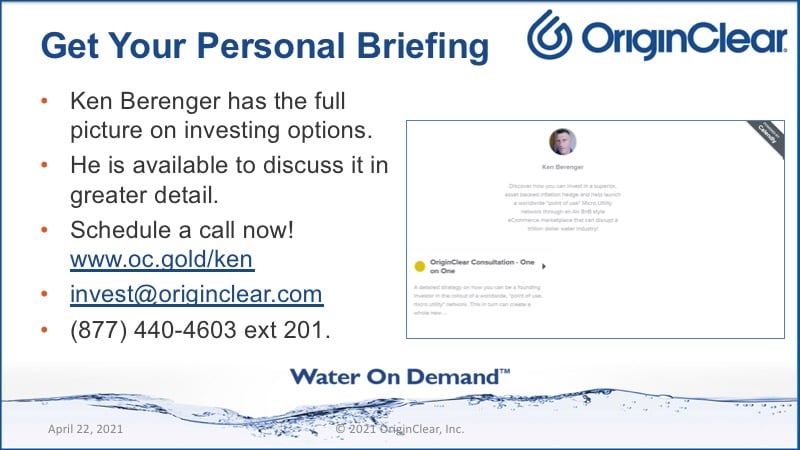
Call Ken
And so people need to call you the best way to do it is just put oc.gold/ Ken in their browser, book a call. He is super booked. He is nonstop. Even I have to beg for a half hour with him. So I would recommend going ahead and booking that if you're interested at all in your options, of course, there's no obligation, but just chat about it. You can send an email, you can make a phone call.
Chats
All right, well, this is bringing us to the end of a very, another very, very interesting briefing. Let me see what we got for chat because that's always interesting. Keith Roeten Happy Earth Day! Thank you very much and he agrees AI and decentralization is definitely the way to go.
And JRW says I've invested in companies from Start Engine and yes, we are talking to both Start Engine and my friends over at Manhattan street, capital, Rod Turner, very dear friend of mine. And so we're talking to both of them and they do a great job. So certainly like the way they market things. So that's already launched. We have meetings set up for tomorrow and next week. All right.
Ken, did you want to have any closing thoughts because I'm pretty much going to wrap this up?
Positioned for Strength
Ken: Yeah, I, when I described to a lot of folks that I've spoken to in the last week is the, our evolution has, has kind of accelerated significantly over the last couple of months. One of the main reasons I'm closing the Series R, it's not filled, it is that we built this thing at a time when we were in a very, very different place, right? Giving away 200% stock on a stock that was a penny or two while we were still pulling the arrows out of our back, so to speak, right.
You know, we really are positioned now for strength. We've seen successful models demonstrated in the market that pale by comparison to ours. And it's really real. I mean, it's a very, very exciting time to be here. So anybody who has any questions about what we've already talked about or wants to kind of dive deeper into the same subject, or hasn't spoken to me for the first time, please, I won't be too busy to talk to you.
Riggs is exaggerating. He doesn't have to beg. He just has to ask nicely or get me at six in the morning or 10 at night, and then I'm fine. No, seriously. I'm available there's way too much ground to cover in these briefings.
I think Riggs does an amazing job of giving you a peek under the cover, but there's, there's a lot of really terrific, tremendous details. You know, basically coming to the surface as we speak that I would love to discuss with you and you'll see how the pieces fit together. It's very exciting,
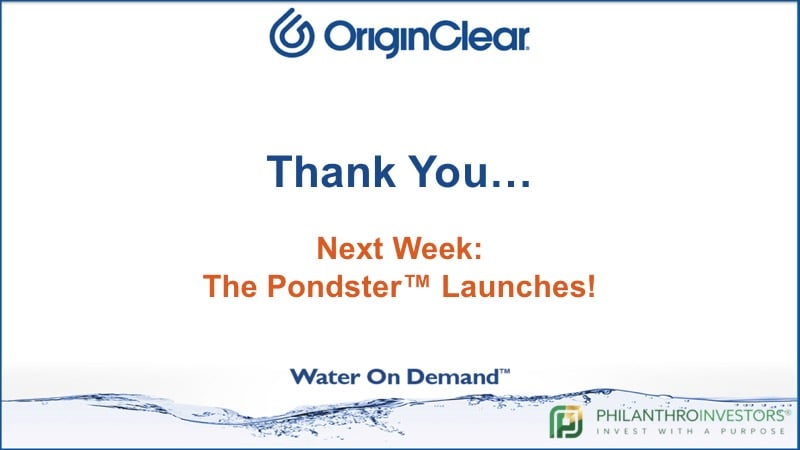
Thank You
Riggs: Truly is. And you're right. That I have to keep it simple in order to not lose my audience. You guys have been incredible next week. I, we have this Pondster™, basically the solution to these filthy lagoons in trailer parks. We're working to try and get a video team over there. So I'm hoping to be able to cover that next week.
In any case, I guarantee you, we will continue to do fun stuff every single week. So please join. It's been so much fun having you and you guys stuck around. Thank you very much. It's been just amazing. Thank you for being here.
Teresa says, thank you. I appreciate it guys. I am so excited about things are going, I was in the.com a time of amazing change, and I feel that now we're able to put that disruptive knowledge to work in the water industry. I can't be more excited and what a great way to spend Earth Day with you. So good night. Thank you very much. Do something sustainable tonight and have a great weekend.
Register for next week’s Insider Briefing: HERE
%20250px.png?width=250&height=53&name=OriginClear%20Logo%202019%20(RGB)%20250px.png)


